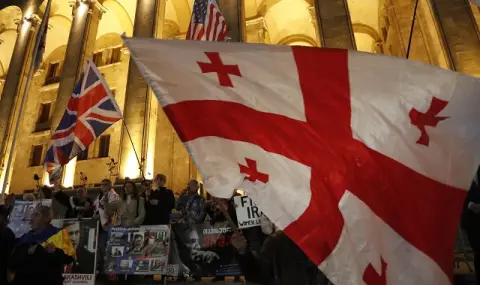The opposition in Georgia accuses the ruling party of being a puppet of Putin. The US has imposed sanctions on its leader, who acts in the interests of Russia. How loyal is the new Georgian leadership to the Kremlin?
A day before the official inauguration ceremony of the new Georgian President Mikhail Kavelashvili, the US sanctioned businessman and leader of the ruling "Georgian Dream" party Bidzina Ivanishvili. In justifying the decision, Secretary of State Anthony Blinken pointed out that Ivanishvili and his party have undermined democratic institutions, allowed human rights violations, restricted fundamental freedoms and diverted Georgia from its Euro-Atlantic path. All this has made the country vulnerable to Russia.
Repressive laws
In June, Georgia's EU accession process was suspended after the country passed a series of repressive laws. However, with the first official acts that Kavelashvili signed as president, he signaled that the country would continue to adopt such laws. He adopted amendments to the law that significantly restrict freedom of assembly. For example, wearing masks during demonstrations, even if it is to protect against tear gas, can be punished with a fine of 2,000 lari (677 euros). In addition, the police can now preemptively arrest people and even detain them in custody to ensure their appearance in court. Although pressure for sanctions and a "cordon sanitaire" is growing in the EU around Ivanishvili and his supporters, Russia is watching the processes in the country with approval and is proposing the resumption of diplomatic relations between the two countries.
Russian military bases?
The countries have not maintained diplomatic relations since 2008, when Russia invaded Georgia and recognized the separatist regions of Abkhazia and South Ossetia as independent states. Now the Kremlin is offering to help "normalize relations" with the breakaway Georgian regions of Abkhazia and South Ossetia, which according to international law still belong to Georgia, as well as to mark their borders. At the same time, however, this would mean that the Georgian government would allow Russian military bases on the territory of the country with thousands of soldiers. However, it seems unlikely that Russia will influence decision-making in Georgia's innermost security structures. Including Western military sources confirm that Georgians have clearly learned their historical lesson after centuries of foreign rule and will not allow outside influence there.
The leader of the "Georgian Dream" party and his supporters manage to derive personal benefit by undermining the sanctions imposed by the West against Russia. Both countries benefit from the direct flights connecting them, as well as the possibility of connecting in Georgia on flights to Western European destinations. Russian businessmen can also take advantage of the recently adopted tax breaks for transferring assets to accounts in Georgia. In June, the number of Russian companies registered in Georgia reached a record high of 37,400, while Russian dissidents are banned from entering the country without giving any reason.
Short-sighted foreign policy
According to Giorgi Gakharia, a former member of Ivanishvili’s government and now an opposition figure, the party leader is aware that close ties with Russia could lead to a dead end. He argues that the strategic partnership with China, political ties with Iran, and integration into an ultraconservative and authoritarian network with Hungarian Prime Minister Viktor Orbán and Azerbaijani President Ilham Aliyev are examples of Ivanishvili’s unstable foreign policy. However, this does not prevent the government from claiming that it wants Georgia to join the EU.
And the people who have been taking to the streets to protest for months do not want to live in an authoritarian state. They also do not want their country to be tossed back and forth like a piece on the international chessboard, nor to become a pawn in the process.
